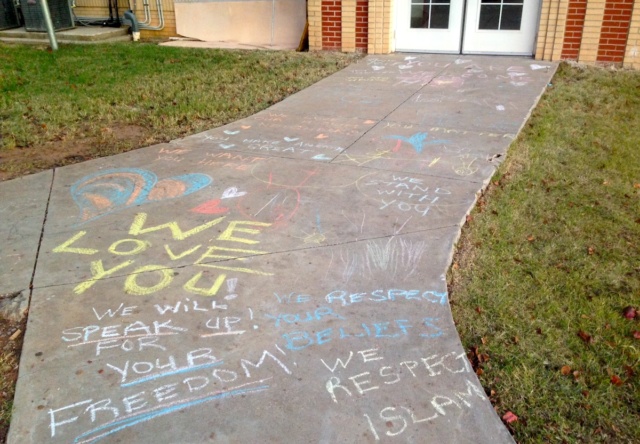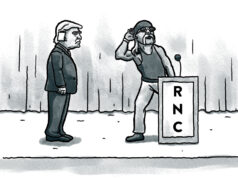

On the eve of Donald Trump’s presidential win, I think I was in shock. It didn’t seem real. At the time, I was too elated that the majority of state questions posed to Oklahoma’s electorate had been answered in ways I believed were favorable to democracy — namely the passage of criminal justice reform, the rejection of Right to Farm and the affirmation of church-state separation.
Now that the dust has settled and I’ve had a chance to read some of the analyses of what happened in the presidential election and why, I find myself considering the following.
The chips have yet to fall
I see and hear a lot of hand-wringing and doom-saying about what’s yet to come under a Donald Trump regime. Some of it, like the balance of congressional power being laid squarely at the feet of Republicans, creates valid concerns for people who would prefer the Democrat policies enacted under President Barack Obama to remain on the books.
What Trump will actually do himself, however, remains to be seen. Remember: This is a guy notorious for lying and for switching stances on policies depending on what he needs at the moment. Duplicity may be a common trait that runs naturally in a politician’s veins, and I can recognize the need for a bit of flip-flopping for the sake of getting things done.
But Trump is no flip-flopper. He’s just a straight-up liar. So who knows which of his campaign “promises” he’ll keep or break? Rather than go full-on Chicken Little about those uncertainties, the fact remains that there are things Trump’s opposition can do to fight against whatever the new president ultimately attempts to do. (See: Last eight years.)
Further, Trump remains unpopular within the GOP establishment. Being president isn’t the same as being appointed as head of a fascist dictatorship. Trump will have to work with people, and those people will likely be getting an earful from their more moderate constituents and others.
Democratic Party detached from heartland
If you find yourself constantly stressed and angered at the antics of the Republican Party (either in Oklahoma or in Washington, D.C.), I would urge you to take a moment and reflect on the failures of the Democratic Party during this election cycle.
Democrats nominated a polarizing politician in former First Lady and Secretary of State Hillary Clinton. Republicans responded with a bold-faced misogynist, race-baiting, ignorant villain with no prior political experience. Yet Clinton lost. Why?
As some have astutely written, the Democrats have become the party of the Big City. As coastal areas of major population centers have turned blue on the backs of support for social justice and individual rights, the rural areas of fly-over ‘merica have only reddened, disenfranchised and personally affronted by the secular agenda they see as favored in mass media. Virtually no messaging in the Clinton campaign attempted to reach out to the religious poor in the sticks, at least not compared to her relentless ads that criticized Trump. Meanwhile, Trump was promising to resuscitate the Rust Belt’s long-dead factories. He called for bringing jobs back, and he re-validated the perspectives of rural whites (ignorant as they sometimes may be).
‘Be the change’
So what can those of us who did not vote for Donald Trump do now?
Mahatma Gandhi’s famous quote, “Be the change that you wish to see in the world,” seems most apt. To a similar degree, comedian Eric Wareheim offered a more specific interpretation recently on Instagram:
Hillary was not gonna fix all our problems. We are gonna fix em. Even if you think it’s a small thing that no one will notice. We are gonna make the change. I’m giving everyone one day to mourn, then tomorrow we rebuild.
Point being, it’s not enough to sit at your computer or stare into your phone, passionately espousing the arguments for or against certain social issues. You have to put your money where your mouse is and manifest a reality that supports your beliefs.
This struck me the other day as I was riding my bike through my neighborhood in southeast OKC, which is predominantly inhabited by Hispanics. I found myself wanting to make eye contact more earnestly, to acknowledge those different than me as an exercise in bridge building. I wanted to let them know the vocal minority that put Trump into office is really just that. I want to make sure that people who see me as a majority white guy think, “Hey, that was a pretty friendly white guy. I guess they’re not all bad.”
Because, as a white cis-gender male, it’s potentially easy to detach oneself from the potential perils facing racial, ethnic and sexual minorities in light of Trump’s victory. It would be easy to say, “Well, I’m sure sorry those people could be facing some very hard times coming up, but I don’t have a dog in that fight.”
To do so is to be complicit in the hate-based attacks minorities have faced just days after the election. For those of us in this demographic of privilege, we must work extra hard — harder than ever, really — to practice in real life what we preach online.
And it’s really rather simple to do: Whenever you encounter people who don’t look, speak or act like you, consider going out of your way to relate to them in a congenial manner. The friendly messages chalked outside of an OKC mosque following the election exemplify this concept.
Take a tip from Dave Chappelle
Last, I found comfort in the words of comedian Dave Chappelle, whose appearance this weekend as host of Saturday Night Live could not have been better timed. At the end of his opening monologue, he had this to say:
I’m wishing Donald Trump luck, and I’m gonna give him a chance. And we, the historically disenfranchised, demand that he give us one, too.
For Chappelle, who often critiqued race relations in America through various sketches on his show, to offer a such a sentiment in light of Trump and some of his supporters’ attitude toward the black community exhibits a profound grace and patience.
We should aspire to emulate the same.




















